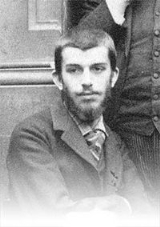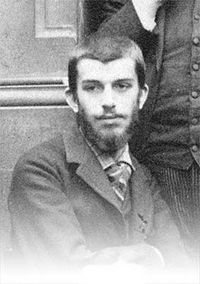
Élie Halévy
Encyclopedia

France
The French Republic , The French Republic , The French Republic , (commonly known as France , is a unitary semi-presidential republic in Western Europe with several overseas territories and islands located on other continents and in the Indian, Pacific, and Atlantic oceans. Metropolitan France...
philosopher and historian
Historian
A historian is a person who studies and writes about the past and is regarded as an authority on it. Historians are concerned with the continuous, methodical narrative and research of past events as relating to the human race; as well as the study of all history in time. If the individual is...
who wrote studies of the British utilitarians, a history of 19th-century England and the acclaimed book of essays, Era of Tyrannies.
Biography
Élie Halévy was born in ÉtretatÉtretat
Étretat is a commune in the Seine-Maritime department in the Haute-Normandie region in northern France. It is a tourist and farming town situated c. 32 km northeast of Le Havre, at the junction of the D940, D11 and D139 roads. It's located on the coast of the Pays de Caux area.-The...
, Seine-Maritime
Seine-Maritime
Seine-Maritime is a French department in the Haute-Normandie region in northern France. It is situated on the northern coast of France, at the mouth of the Seine, and includes the cities of Rouen and Le Havre...
, where his mother had fled as the German army marched on Paris
Paris
Paris is the capital and largest city in France, situated on the river Seine, in northern France, at the heart of the Île-de-France region...
. His father was the playwright Ludovic Halévy
Ludovic Halévy
Ludovic Halévy was a French author and playwright. He was half Jewish : his Jewish father had converted to Christianity prior to his birth, to marry his mother, née Alexandrine Lebas.-Biography:Ludovic Halévy was born in Paris...
, his brother Daniel Halévy
Daniel Halévy
Daniel Halévy was a French historian.The son of Ludovic Halévy, Daniel was born and died in Paris...
; Halévy grew up surrounded by musicians, scholars, and politicians. After studying at the École Normale Supérieure
École Normale Supérieure
The École normale supérieure is one of the most prestigious French grandes écoles...
, he received his doctorate in philosophy in 1901 with the theses The Platonic Theory of Knowledge and The Origins of Philosophical Radicalism. The latter formed the base of his first major study, The Formation of English Philosophical Radicalism (3 vols., 1901-1904).
In an article of 1893, Halévy suggested that the great moral question of modern thought was how the abstract idea of duty could become a concrete aim of society. This question had first attracted him to the utilitarians, and he found at the core of their answer a fundamental contradiction. Utilitarianism, he said, was based on two principles: first, that the science of the legislator must bring together the naturally divergent interests of individuals in society; and, second, that social order comes about spontaneously through the harmony of individual interests. To Halévy, this exemplified two fundamental human attitudes toward the universe: the contemplation of the astronomer and the intervention of the engineer.
In 1892, Émile Boutmy invited Halévy to lecture on English political ideas at the newly founded School of Political Science. After 1900, he alternated this course with another, on the history of socialism. At the same time he helped found the Revue de métaphysique et de morale
Revue de métaphysique et de morale
The Revue de métaphysique et de morale is a French philosophy journal co-founded in 1893 by Léon Brunschvicg, Xavier Léon and Élie Halévy. The journal initially appeared six times a year, but since 1920 has been published quarterly...
, in which he retained an interest until his death.
Halévy's teaching led him to undertake annual trips to England, during which he became the intimate friend of many of the most important scholars and political figures of the age. He thoroughly explored the Jeremy Bentham
Jeremy Bentham
Jeremy Bentham was an English jurist, philosopher, and legal and social reformer. He became a leading theorist in Anglo-American philosophy of law, and a political radical whose ideas influenced the development of welfarism...
manuscripts at Cambridge for his work on philosophical radicalism and over the years developed a deep and intensive knowledge of all the sources of 19th-century English history. In 1901 he began to work on the first volume of his masterpiece, the History of the English People in the Nineteenth Century (published from 1913 onwards). In this first volume, he described England in 1815 and sought to explain how England avoided violent social change. "If economic facts explain the course taken by the human race," he wrote, "the England of the nineteenth century was surely, above all other countries, destined to revolution, both politically and religiously." Neither the British constitution nor the Established Church was strong enough to hold the country together. He found the answer in religious nonconformity: "Methodism was the antidote to Jacobinism."
He did not write his history in chronological sequence, nor did he live to complete it. The second and third volumes of this history (1923) carried the story up to 1841. Then Halévy, profoundly moved by World War I
World War I
World War I , which was predominantly called the World War or the Great War from its occurrence until 1939, and the First World War or World War I thereafter, was a major war centred in Europe that began on 28 July 1914 and lasted until 11 November 1918...
, turned his attention to the period from 1895 to 1914. The two volumes on this period (published in 1926-1930) were written with considerable detachment, considering the immediacy of the problems he discussed. Together with Célestin Bouglé
Célestin Bouglé
Célestin Bouglé was a French philosopher known for his role as one of Émile Durkheim's collaborators and a member of the Annee Sociologique.-Life:...
he would republish a set of Saint-Simonian lectures of the 1830, bundled in the 1924 work Doctrine de Saint-Simon.
In lectures of 1929, revised in 1936 (published in 1938; The Era of Tyrannies), Halévy argued that the world war had increased national control over individual activities and opened the way for de facto socialism. In opposition to those who saw socialism as the last step in the French Revolution
French Revolution
The French Revolution , sometimes distinguished as the 'Great French Revolution' , was a period of radical social and political upheaval in France and Europe. The absolute monarchy that had ruled France for centuries collapsed in three years...
, he saw it as a new organization of constraint replacing those that the Revolution had destroyed. Wallas translates:
In what proved to be his last work (which he did not live to complete), Halévy began to bridge the gap between 1841 and 1895 with a volume entitled The Age of Peel and Cobden (1841-1852). A liberal individualist to the last, Halévy died at Sucy-en-Brie
Sucy-en-Brie
Sucy-en-Brie is a commune in the southeastern suburbs of Paris, France. It is located from the center of Paris.-Transport:Sucy-en-Brie is served by Sucy – Bonneuil station on Paris RER line A.-Personalities:*Nicolas Maurice-Belay,footballer...
on 21 August 1937. His publishers postumously commissioned R. B. McCallum to contribute a supplementary essay to link this volume with the concluding ones, the whole appearing under the tit;e Victorian Years in 1961.
Books
- La théorie platonPlatonPlatoń is a village in the administrative district of Gmina Czarnożyły, within Wieluń County, Łódź Voivodeship, in central Poland. It lies approximately west of Czarnożyły, north-west of Wieluń, and south-west of the regional capital Łódź.-References:...
icienne des sciences. Paris 1896; Repr. Scientia, AalenAalenAalen is a city in the German state of Baden-Württemberg, about east of Stuttgart and north of Ulm. It is the seat of the Ostalbkreis district, and its largest city, as well as the largest city within the Ostwürttemberg region. In spatial planning, Aalen is designated a Mittelzentrum...
1974 ISBN 3511009251; Nabu-Press, 2010 ISBN 1177311607 - Histoire de peuple anglais aux dix-neuvième siècle (in English: Halévy's History of the English People in the Nineteenth Century. Transl. E. I. Watkin. Ernest Benn Ltd, London, 1931-32.) (in 6 volumes)
- England in 1815 (1913)
- The Liberal Awakening (1815-1830) (1923)
- The Triumph of Reform (1830-1841)
- Victorian Years (1841-1895)
- Imperialism and the Rise of Labour (1895-1905)
- The Rule of Democracy (1905-1914)
- in English: The Era of tyrannies. Essays on socialism and war. Transl. R. K. Webb. Note by Fritz SternFritz SternFritz Richard Stern is a German-born American historian of German history, Jewish history, and historiography. He is a University Professor Emeritus and a former provost at New York's Columbia University...
. Doubleday, NY 1965; Allen Lane-Penguin, London 1967

